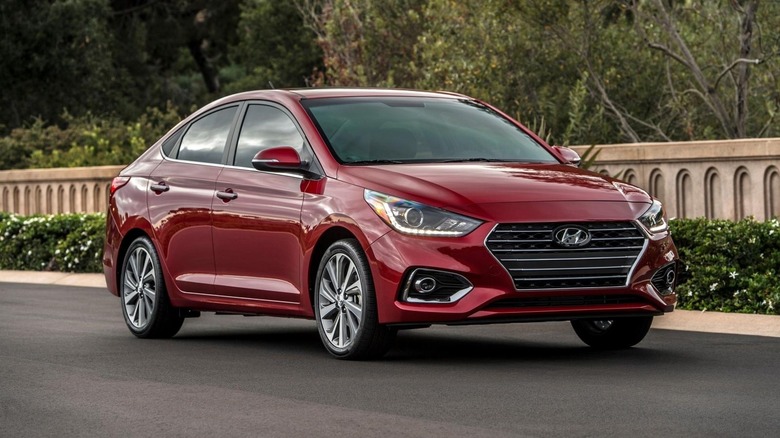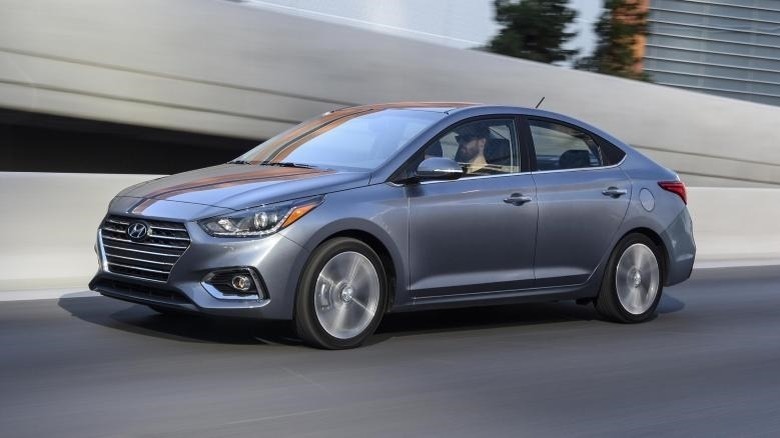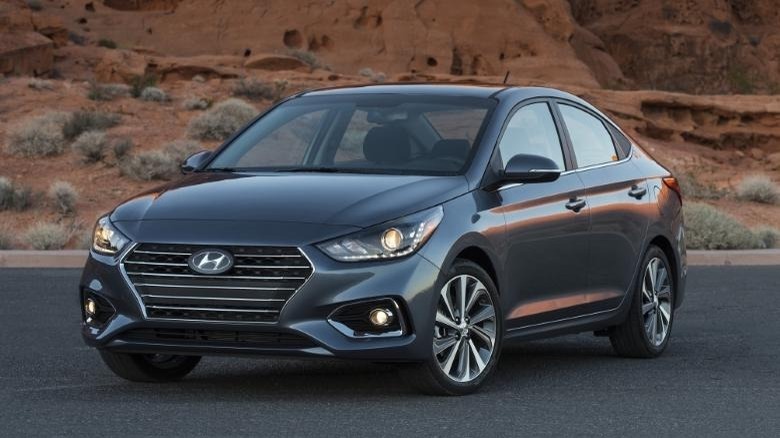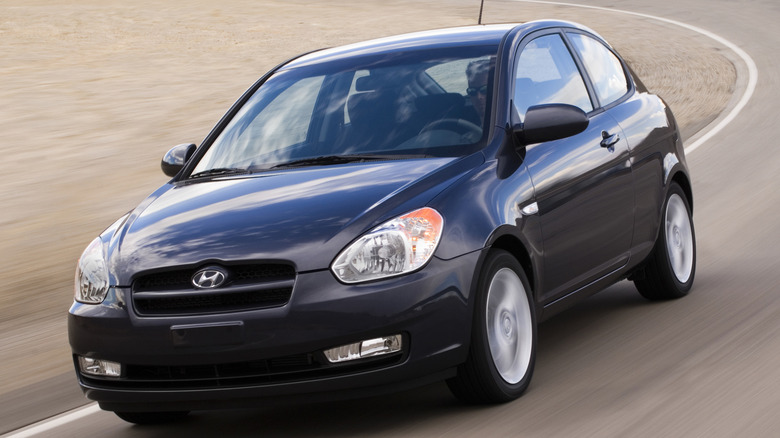Here's Why Hyundai Discontinued The Accent In North America
Each year, certain cars, trucks, and SUVs reach the end of their production cycle and, for any number of reasons, are discontinued. The Chevrolet Camaro, Ford Escape, Audi A4, Nissan GT-R, Alfa Romeo Stelvio Quadrifoglio, and gas-powered Giulia Quadrifoglio are among the latest victims of this yearly purge. They won't be returning to the U.S. market after 2024 due to reasons including slow sales, focuses on electric powertrains, model portfolio shuffling, and downsizing.
Just two years earlier, Hyundai discontinued the Accent, which, up to that point, was considered one of the most reliable Hyundai models ever built. Experts also praised the Accent for its impressive fuel economy. In EPA testing, a fifth-gen Hyundai Accent with the 1.6-liter inline four-cylinder engine and continuously variable automatic transmission returned 33 mpg in the city, 41 mpg on the highway, and 36 mpg combined. The Accent was also noted for its generous seating, straightforward infotainment system, and extraordinarily quiet, comfortable driving experience.
Given its many remarkable qualities, you might wonder why Hyundai had to discontinue the Accent. So let's look back at the Accent and the factors that prompted Hyundai to retire it.
What kind of car was the Hyundai Accent?
The Hyundai Accent was a subcompact car introduced in 1994 ahead of the 1995 model year. It was conceived as a replacement for the Hyundai Excel and spanned five generations until its discontinuation in 2022. The original model had a 1.5-liter SOHC inline-four engine borrowed from the Hyundai Scoupe. The powertrain channeled 92 horsepower and 96 pound-feet of torque to the front wheels via a five-speed manual transmission; a four-speed automatic was available as an option. Before you laugh at its modest performance, remember that the Accent was marketed as an inexpensive commuter car and also ideal as a first car for new drivers who don't need too much power.
In the North American market, the first-generation Hyundai Accent was available in a three-door coupe or a four-door sedan. A three-door hatchback variant of the Accent was introduced in the U.S. in 2006 for the 2007 model year, and by 2013, it was joined by the larger Elantra GT hatchback. The Accent Hatchback did well in our head-to-head comparison with the Elantra GT.
Hyundai is shifting focus to SUVs
Hyundai said it pulled the plug on the Accent because it had added the new Venue SUV, which then became the brand's entry-level model. While the South Korean automaker said sedans will continue to be a key part of its lineup, it's becoming increasingly clear that traditional gasoline sedans — and compact cars in general — will be less important for Hyundai as it matches toward an electrified and SUV-dominated future.
Between 2016 and 2022, Hyundai killed off many well-known names, including the Hyundai Veloster, Equus, Elantra Sport, Elantra GT, Azera, and Accent. This has given Hyundai plenty of room to ramp up electrified vehicle production in its bid to become a leading EV manufacturer by 2030.
Even so, SUVs will continue to occupy a prominent role in the Seoul-based automaker's model portfolio. Hyundai's lineup for the 2025 model year includes a dozen SUVs — the Venue, Ioniq 5 and 5 N, Ioniq 9, Kona, Kona Electric, Tucson, Tucson Hybrid, Nexo, Palisade, Santa Fe, and Santa Fe Hybrid. By comparison, its car portfolio for 2025 includes just four: the Elantra, Sonata, Elantra N, and Ioniq 6.
The Hyundai Accent was also hurt by slowing sales
While Hyundai did not point to lackluster sales as being a reason for discontinuing the Accent, it's clear the compact car's underwhelming sales performance did not present a strong enough case to warrant its continuation. Data from GoodCarBadCar, which started tracking it in 2005, shows that the Hyundai Accent sales in the U.S. went from an all-time high of 79,766 in 2016 to 58,955 in 2017 and kept falling. By 2020 Accent sales had dropped to an abysmal 15,975, but went slightly back up to 18,868 in 2021 before again retracting to 17,823 in its final production year in 2022.
The dismal figures meant Accent sales remained below the very strong levels of demand for Hyundai SUVs, which by this time had started to become common sights on U.S. roads. The Hyundai Palisade, for example, sold 28,736 units in its first production year in 2019 but soon began flying off dealer lots, with a whopping 81,905 units moved in 2020 alone. Since then, consumer interest in the midsize SUV has stayed consistently high, with 86,282, 82,688, and 89,509 units sold in 2021, 2022, and 2023, respectively. So it made sense that Hyundai saw fit to retire the underperforming Accent to make way for SUVs, especially given modern consumers' preference for the higher-riding vehicles.



